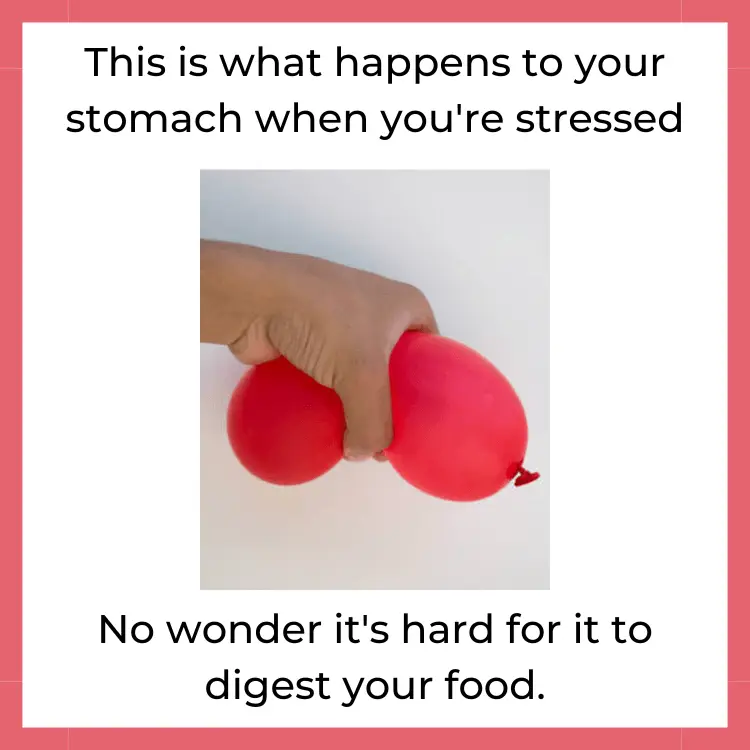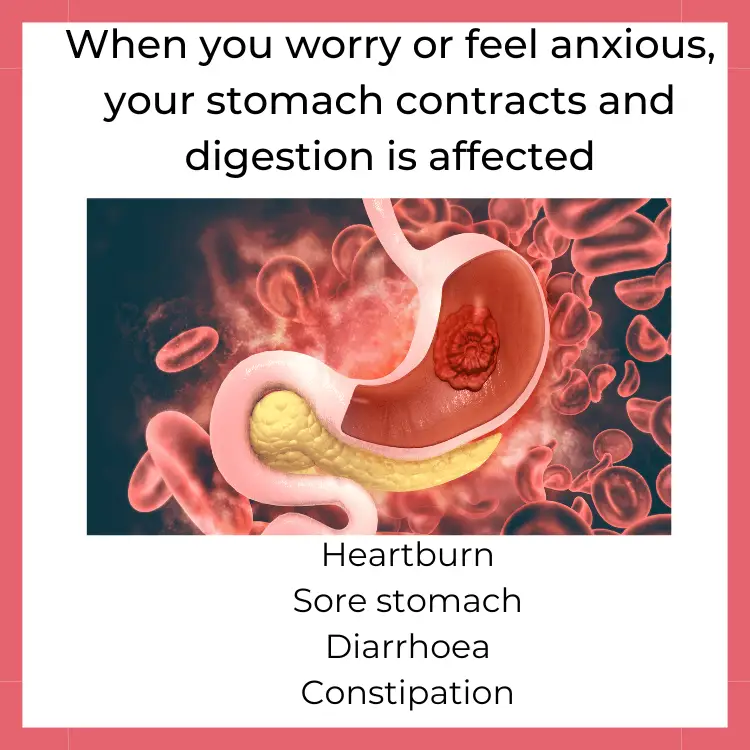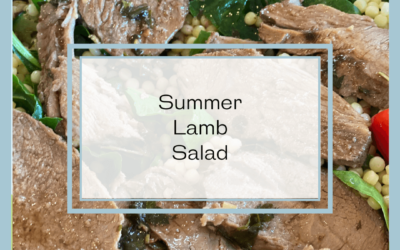How Stress Affects your Gut and Weight
Do you struggle with digestive issues? Maybe you are fine most of the day and then seemingly out of the blue, your stomach starts playing up. Suddenly you’re bloated, which makes your clothes feel tight and uncomfortable. You’re scared to even wear your favourite pants to work anymore in case you become bloated. Your bowel habits are all over the place and you never quite know what to expect – will you be needing to go to the toilet frequently or will you not go for days? Every day you ask yourself “what did I eat today to cause these symptoms?” Why does it feel so complicated?
As a dietitian and nutritionist with a special interest in bowel issues, I know that food can totally be playing a role. In fact, I frequently work with clients with this issue and by careful, proper food modification, we usually know in about 3 weeks whether food is impacting their gut symptoms.
Sometimes, though, there are other causes. Let’s take a moment in this blog and explore how stress might be involved and what you can do about it.
Your second brain
Did you know that your gut is often called the second brain? Your gut can’t think like the brain does, but it can send messages and communicate to the brain. It also has its own nervous system, so that it can manage your digestion. It knows when to swallow and when to release juices to break down the food into usable nutrients. Lastly, it also knows how to distinguish between usable nutrients and waste products. Talk about an efficient system!
As well, your brain and gut can actually communicate both ways. You may have heard the term “gut feeling”? This is because your gut actually senses when you are feeling anxious or stressed. Think about that time when you had a meeting at work and you realised you weren’t prepared for it – you suddenly got that sinking feeling in your stomach. That is your brain sending messages to your gut telling it you are stressed.
What might you experience in your gut?
Imagine any of these scenarios:
- One of your co-workers complained about something you did
- You said something that was a bit silly in the staffroom
- You have a function to go to and you don’t know anyone
- You are at an ATM and notice someone threatening coming up behind you
In all of these, your body feels under threat. Remember my previous blog where I talked about the 3 different types of stressors? Your brain doesn’t realise that there is a difference between the threatening person versus you worrying about what your co-worker said. To your brain it means one thing: my host is in danger and I need to do something to help!!
Essentially your body goes into action mode and switches its priorities to focusing on the urgent threat. It’s exactly what you would do, I’m sure, if you suddenly realised that you overslept. All the niceties go out the window and you just do what is essential to manage the emergency.
So your brain triggers the release of the stress chemicals, which impacts your whole body. Let’s just focus on your gut for now and look at what happens there:
Your stomach constricts, which increases the acids in your stomach, increasing your chance of heartburn. Because of this constriction and digestion becoming less of a priority, food doesn’t move through your system like it should. I’ve provided a visual to show you what this might look like.
Can stress impact your weight?
The answer is yes. Let’s look at what happens inside your body when you are in a constant state of worry about that conflict you had at work.
- Stress gives you quick energy
This may sound like a good thing and it is if you have a quick, healthy stress response. Your body wants to prepare you to be able to escape the danger, so it releases cortisol, a stress hormone. Cortisol helps provide the large muscles in your legs with quick acting energy. In response to cortisol, sugars called glucose, are released from stores within the body. Your body can also make sugar, but I don’t want to get too complicated here.
You now have increased circulating glucose in your body. In normal situations, your body tries to avoid this and so it releases another hormone called insulin to help “push” that glucose into as many cells as possible. It can only do this, however, when the cortisol levels aren’t high. So, when you keep worrying, the cortisol stops this from happening as effectively. It’s a bit like when your partner filters what you say, so half of the message can’t be taken in.
If your body isn’t able to use the glucose properly, it starts converting and storing it as fat, usually around the stomach area.
See the two attached diagrams to illustrate two different stress responses.
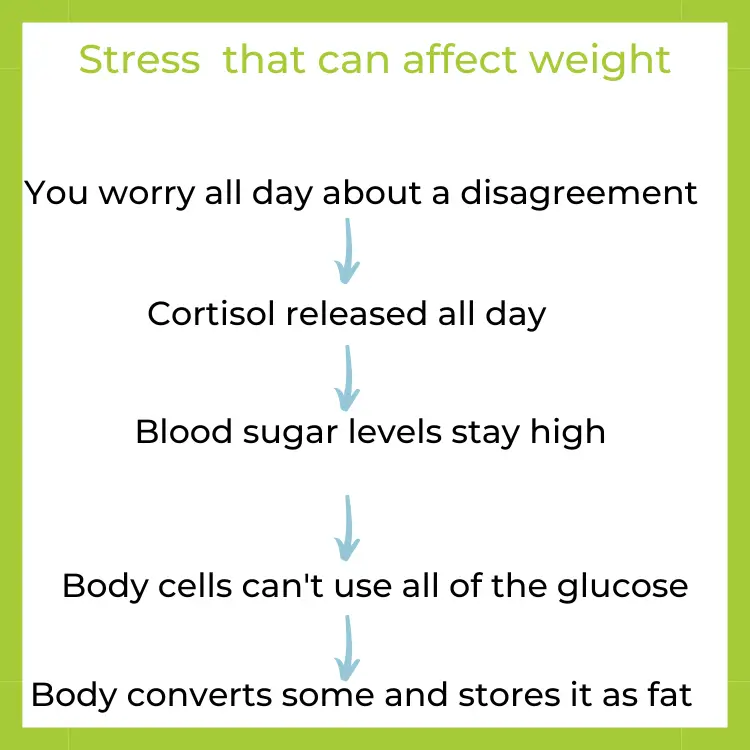
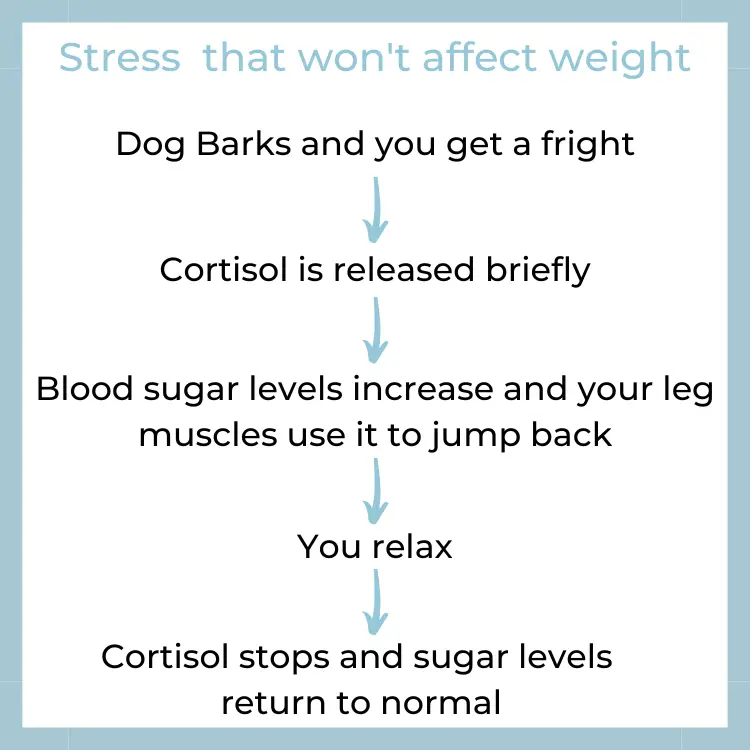
- Stress increases cravings.
Did you know that you have about the same number of bacteria cells in your gut as there are human cells in your body? So, what is going on with these bacteria cells can have a very big impact on you.
When someone is in constant stress, the cortisol can affect these bacteria and what they do. The way they can influence your weight is in three main ways.
- The bacteria in the gut that thrive on sugar, send signals to the brain encouraging you to have more sugar.
- The bacteria then make more of the feel-good chemicals, so when you do have the cake or biscuits, it makes you feel REALLY good.
- The bacteria also increase the production of hormones that increase your desire for high energy foods, so yet again, you reach for the cake, biscuits or pies.
As if that wasn’t enough, remember your body isn’t even able to use all of that extra sugar you are giving it, so your brain thinks you are still hungry. When this happens, it will trigger you into thinking you need more food.
You can see that lacking willpower has got nothing to do with those cravings!!
So clearly, stress has a huge impact on how food is digested and used in your body. But, it doesn’t have to be that way.
What can you do?
Managing stress and its effects on our body, requires adjusting many things in our lives. For you it may mean changing your mindset, or reducing expectations or having a better work-life balance.
Here are two tips to try today:
- Before you eat, close your eyes for a few minutes and do an assessment of your body. Are your shoulders tense, is your stomach feeling agitated? Take a few slow breathes and as you do so, actively relax those parts of your body that are tense. Remember, this doesn’t need to take long and it won’t interfere with your to-do list.
By doing this, you are now allowing your stress chemicals to switch off, your stomach to relax and allow your body to start secreting all the juices needed to make sure that the digestive process can start. Teachers don’t start teaching while children are walking into class after their lunch break. They give them a moment to take out their books and pens and prepare themselves for the lesson. So why not give your body a chance to be prepared for the food that is coming.

- Choose one meal of the day when you just relax for 30 minutes after you have eaten. Remember relaxing can mean standing and doing the dishes, but not worrying about the day while you are doing them. It is possible to be doing something AND be in a non-stressed state. If you need to wash the dishes straight after eating or pack the dishwasher, as you are doing this, see if you can focus your attention on what you are doing. By focusing on the task at hand and not worrying about what you didn’t do or need to do, your body will not feel under threat and so it will be able to continue keeping its focus on digestion.
If you’d like help with anything I’ve talked about in this blog, contact me here. You can also read testimonials from clients I have worked with and see if any of their stories resonate with you here.

